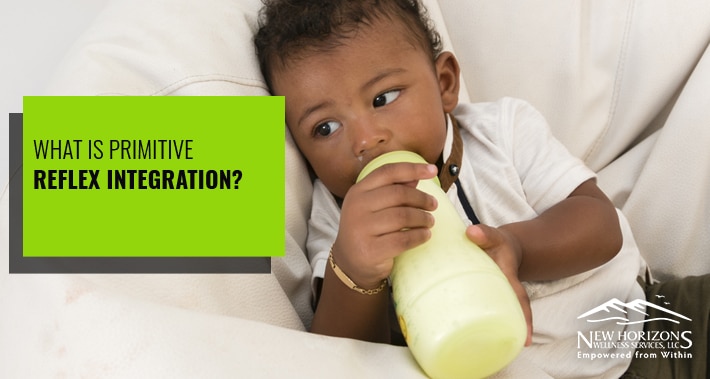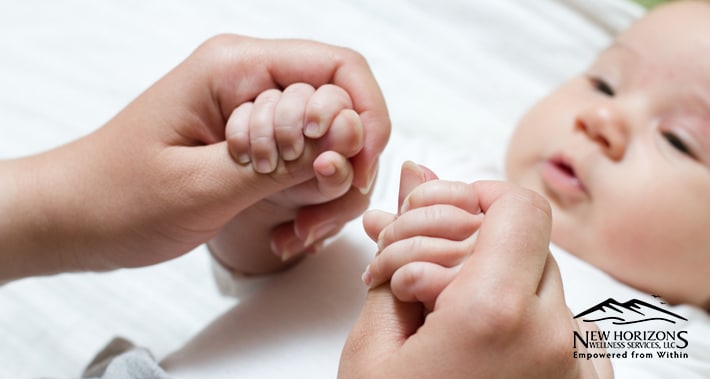
We sometimes think of infants as completely helpless and who can’t do anything for themselves. This is mostly true. But they do have a number of innate reflexes. These help keep them safe in those early days of life.
These are referred to as “primitive reflexes.” In most children they will disappear with the passing of time as they become less and less useful. If they don’t, these same reflexes which were once important for survival can have adverse effects. Occupational therapy for children near me here at New Horizons Wellness Services can help. Let’s explore primitive reflexes.
We’ll take a look at what they are, how they work, and how occupational therapy can help.
What Are Primitive Reflexes?
Primitive reflexes are automatic movements. They happen as feedback to specific activity associated with the neck and head. These movements are tools all infants have. They’re considered essential for survival. As children learn to control their movements, these reflexes will start to integrate as they meet new occupational therapy developmental milestones.
What Are Primitive Reflexes Examples?
In this section, we’ll look at examples of some of the spontaneous, or involuntary, reflexes you’ll see in infants. Examples include the following:
1. Suck Reflex
The suck reflex usually develops between week 32 and week 36 of pregnancy and is sometimes weakened in premature babies. It’s triggered by the roof of the mouth being touched. Because of a hand to mouth reflex, sometimes infants will suck on their hands and fingers.
2. Rooting Reflex
The rooting reflex is what helps a baby to find the nipple of a bottle, or to begin chest or breastfeeding. It happens when the corner of the mouth is touched, causing them to turn their head in the direction of the touch. Typically this reflex lasts for about four months.
3. Grasp Reflex
Stroke the palm of your baby’s hand, and they’ll grab your finger. This is the grasp reflex. As the name suggests, it causes the baby to close their hand, or make a “grasping” motion. It should last until about six months old.
4. Stepping Reflex
Sometimes referred to as the “dance” or “walking” reflex, this occurs when a baby is help up so their feet touch a solid surface. It’s called this because this reflex makes it look like they’re trying to take steps or dance. This reflex lasts about two months after birth.
5. Startle Reflex
In response to a movement or loud noise, this reflex involves the infant throwing their head back, and extending and then contracting their arms and legs. Sometimes this reflex, which is also called the “Moro reflex” can be stimulated by a baby’s own cries. This doesn’t usually last beyond two months old.
6. Tonic Neck Reflex
This is also known as the “fencing” reflex. When your baby’s neck turns to one side, their arm on the same side will stretch out. Their other arm will bends at the elbow. Typically, this reflex will stop after about seven months old. If it doesn’t, your baby may have trouble developing certain fine motor skills like crossing the midline.
How Do Primitive Reflexes Integrate?
As your baby learns to better control their movements, primitive reflexes will go away, or integrate. This is associated with meeting developmental milestones. These milestones can include learning to hold up their head, crawling, and walking.

What Causes Primitive Reflexes To Not Integrate Naturally?
In some cases, primitive reflexes don’t integrate as they’re expected to. We don’t yet understand exactly why this happens. But we do know some risk factors. Some of these include issues during pregnancy like:
- Severe vomiting or morning sickness
- Increases stress during pregnancy
- Use of alcohol, drugs, or smoking
- Viral infection
Others can happen during birth, including:
- Issues with the placenta
- Use of forceps during birth
- Prolonged labor
- Cesarian section
- Breach birth
- Umbilical cord being wrapped around the neck
In newborns, the following issues may contribute to reflexes not integrating:
- Jaundice
- Low weight at birth
- High fever
- Issues with feeding
Do People With ADHD Have Retained Primitive Reflexes?
Some children with ADHD may have retained primitive reflexes.A 2016 study in the Archives of Medical Science shows a link between retained primitive reflexes and cognitive challenges. This may also be a factor in cases of ADHD, and can lead to ADHD symptoms such as poor concentration and fidgeting.
RELATED: How Can Occupational Therapy Help With ADHD?
Retained primitive reflexes have also been linked with other disorders, like autism spectrum disorder and sensory processing disorder.
How To Tell If Your Child’s Primitive Reflexes Haven’t Integrated
Children whose reflexes haven’t integrated may have difficulty with the following tasks:
- Sitting still
- Gross motor skills like catching, throwing, jumping, and running
- Fine motor skills like hand movements
- Eye tracking
Other signs include:
- Sitting with legs in a “W” position
- Bed wetting beyond age five
- Low impulse control
- Impaired concentration
- Chronic thumb and finger sucking
- Drooling
How Can Primitive Reflex Integration Occupational Therapy Help?
If your child is showing signs that their primitive reflexes haven’t integrated, an occupational therapist can help. They’ll perform an assessment of your child’s skills and attempt to discover the reasons for these delays. You may have noticed some of the above symptoms are also characteristics of children with ADHD and other neurological disorders. Occupational therapy for integrating reflexes will involve movements which work with, and against reflexes. Your pediatric occupational therapist will give you activities to practice at home as well.
Book Your Appointment With New Horizons Wellness Services Today
Is your child showing signs of developmental delays? After reading this article, do you think it may be related to poor primitive reflex integration? If so, we’re New Horizons Wellness Services, and we can help. We help families in the Portland area meet their developmental milestones so they can grow into happy, healthy adults. Contact us to book an appointment today.

Yours in Health,
New Horizons Wellness Services13333 SW 68th Pkwy,
Tigard, OR 97223
- https://g.page/newhws
New Horizons Wellness Services provides a true multidisciplinary approach to mental & physical health treatments for children, adults and families.